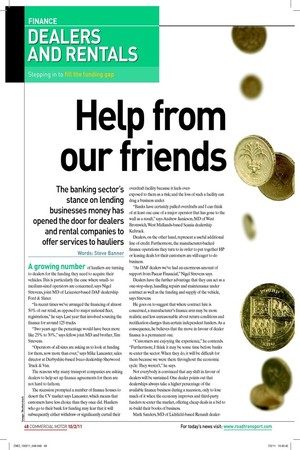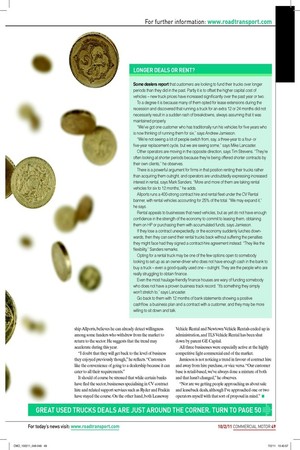Help from our friends
Page 34

Page 35

If you've noticed an error in this article please click here to report it so we can fix it.
The banking sector’s stance on lending businesses money has opened the door for dealers and rental companies to offer services to hauliers
Words: Steve Banner A growing number of hauliers are turning to dealers for the funding they need to acquire their vehicles. This is particularly the case where smallto medium-sized operators are concerned, says Nigel Strevens, joint MD of Leicester-based DAF dealership Ford & Slater.
“In recent times we’ve arranged the inancing of almost 50% of our retail, as opposed to major national leet, registrations,” he says. Last year that involved sourcing the inance for around 125 trucks.
“Two years ago the percentage would have been more like 25% to 30%,” says fellow joint MD and brother, Tim Strevens.
“Operators of all sizes are asking us to look at funding for them, now more than ever,” says Mike Lancaster, sales director at Derbyshire-based Iveco dealership Sherwood Truck & Van.
The reasons why many transport companies are asking dealers to help set up inance agreements for them are not hard to fathom.
The recession prompted a number of inance houses to desert the CV market says Lancaster, which means that customers have less choice than they once did. Hauliers who go to their bank for funding may fear that it will subsequently either withdraw or signiicantly curtail their overdraft facility because it feels over exposed to them as a risk; and the loss of such a facility can drag a business under.
“Banks have certainly pulled overdrafts and I can think of at least one case of a major operator that has gone to the wall as a result,” says Andrew Jamieson, MD of West Bromwich, West Midlands-based Scania dealership Keltruck.
Dealers, on the other hand, represent a useful additional line of credit. Furthermore, the manufacturer-backed inance operations they turn to in order to put together HP or leasing deals for their customers are still eager to do business.
“As DAF dealers we’ve had an enormous amount of support from Paccar Financial,” Nigel Strevens says.
Dealers have the further advantage that they can act as a one-stop-shop, handling repairs and maintenance under contract as well as the funding and supply of the vehicle, says Strevens.
He goes on to suggest that where contract hire is concerned, a manufacturer’s inance arm may be more realistic and less unreasonable about return conditions and rectiication charges than certain independent funders. As a consequence, he believes that the move in favour of dealer inance is a permanent one.
“Customers are enjoying the experience,” he contends. “Furthermore, I think it may be some time before banks re-enter the sector. When they do, it will be dificult for them because we were there throughout the economic cycle. They weren’t,” he says.
Not everybody is convinced that any shift in favour of dealers will be sustained. One dealer points out that dealerships always take a higher percentage of the available inance business during a recession, only to lose much of it when the economy improves and third-party funders re-enter the market, offering cheap deals in a bid to re-build their books of business.
Mark Sanders, MD of Lichield-based Renault dealer ship Allports, believes he can already detect willingness among some funders who withdrew from the market to return to the sector. He suggests that the trend may accelerate during this year.
“I doubt that they will get back to the level of business they enjoyed previously though,” he relects. “Customers like the convenience of going to a dealership because it can cater to all their requirements.” It should of course be stressed that while certain banks have led the sector, businesses specialising in CV contract hire and related support services such as Ryder and Fraikin have stayed the course. On the other hand, both Leaseway Vehicle Rental and Newtown Vehicle Rentals ended up in administration, and TLS Vehicle Rental has been shut down by parent GE Capital.
All three businesses were especially active at the highly competitive light commercial end of the market.
Jamieson is not noticing a trend in favour of contract hire and away from hire purchase, or vice versa. “Our customer base is retail-based, we’ve always done a mixture of both and that hasn’t changed,” he observes.
“Nor are we getting people approaching us about sale and leaseback deals, although I’ve approached one or two operators myself with that sort of proposal in mind.” ■





































